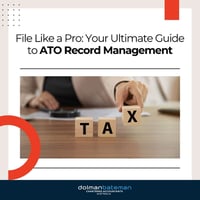A really simple free way of keeping track of what your competitors are doing online is Google...
Keep Your Receipts, Keep Your Sanity: Mastering Tax Record Keeping

Managing tax records can be daunting, but mastering it is essential for maximising deductions and staying compliant with the Australian Taxation Office (ATO) requirements.
As you keep reading, we’ll highlight the importance of record-keeping, outline essential records to maintain, provide tips for claiming expenses, prepare you for potential ATO audits, and suggest tools and tips to streamline the process.
Why Record-Keeping Matters
Importance for Tax Deductions and Compliance
Good record-keeping is crucial for several reasons:
- Maximising Deductions: Accurate records ensure you claim all eligible deductions, reducing your taxable income and saving money.
- Compliance: The ATO requires businesses and individuals to keep detailed records of income and expenses. Proper documentation helps you comply with these regulations and avoid penalties.
- Audit Preparedness: In the event of an audit, well-maintained records provide the necessary proof of your claims, making the audit process smoother and less stressful.
Essential Records
Receipts, Invoices, and Digital Tools
To maintain comprehensive tax records, focus on these essential documents:
- Receipts: Keep receipts for all business-related purchases, including office supplies, travel expenses, and equipment. These provide proof of your expenses and are necessary for claiming deductions.
- Invoices: Record all income by saving invoices issued to clients. This helps track your earnings and ensures you report all income accurately.
- Digital Tools: Use accounting software and apps to store and organise your records. Digital tools can automate much of the record-keeping process, making it easier to track expenses and income.
Claiming Expenses
Criteria for Deductions and Common Expenses
Knowing what expenses you can deduct is key to reducing your tax liability:
- Criteria for Deductions: The ATO allows deductions for expenses directly related to earning your income. Ensure the expense is necessary for your business and keep detailed records to support your claim.
- Common Expenses: Typical deductible expenses include:
- Home Office Expenses: Portions of rent, utilities, and internet costs.
- Travel Expenses: Costs for business-related travel, including transportation, accommodation, and meals.
- Equipment and Supplies: Costs for purchasing business equipment and office supplies.
- Professional Services: Fees for accountants, lawyers, and consultants.
Preparing for ATO Audits
Common Triggers and Necessary Documentation
Audits can be triggered by various factors, and being prepared is crucial:
- Common Triggers: Triggers for audits can include significant fluctuations in income or expenses, consistently high deductions relative to income, and discrepancies between reported income and third-party data.
- Necessary Documentation: Maintain comprehensive records of all transactions, including receipts, invoices, bank statements, and digital records. This documentation helps substantiate your claims during an audit.
Tools and Tips
Apps, Software, and Organisational Strategies
Using the right tools and strategies can simplify record-keeping:
- Apps and Software: Tools like QuickBooks, Xero, and Expensify can automate expense tracking, invoicing, and record-keeping. These platforms provide real-time updates and detailed financial reports.
- Organisational Strategies: Implement strategies to keep your records organised:
- Regular Updates: Update your records regularly to ensure accuracy and completeness.
- Categorisation: Categorise expenses and income to make it easier to track and report.
- Backups: Keep digital backups of all records to prevent loss of information due to physical damage or theft.
Effective Record-keeping is the Key
Effective record-keeping is the foundation of successful tax management. By understanding its importance, maintaining essential records, knowing how to claim expenses, preparing for audits, and utilising the right tools and strategies, you can keep your finances in order and your sanity intact.
For expert guidance and personalised assistance with your tax obligations, consider partnering with a professional tax advisor.
At Dolman Bateman, we specialise in helping influencers and small businesses navigate their unique tax challenges.
Contact us at 02 9411 5422 to ensure you’re making the most of your deductions and staying compliant with ATO requirements.
Let us help you master your tax record-keeping and achieve your financial goals.




